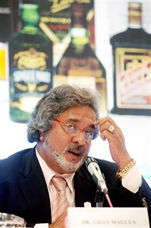|
 Now
that exorbitant tariffs of up to 550% on Scotch whisky,
not to mention other measures against imported spirits,
will work against his new investment, there is no longer
any point in the chairman of United Spirits pretending
the barriers that have largely kept the Scottish whisky
industry out of India are justifiable, reports Sunday
Herald. Now
that exorbitant tariffs of up to 550% on Scotch whisky,
not to mention other measures against imported spirits,
will work against his new investment, there is no longer
any point in the chairman of United Spirits pretending
the barriers that have largely kept the Scottish whisky
industry out of India are justifiable, reports Sunday
Herald.
By ensuring a virtually protected market the duties
certainly helped Mallya build United Spirits from a
business worth perhaps £100m when he took it over
from his father in 1983, but they now prevent him from
making the most of his ownership of Whyte & Mackay.
Under the current sky-high barriers, United Spirits
will not be able to sell its new label at prices Indian
consumers can afford. And, as a powerful politician
with enormous financial and political clout, Scotland's
latest whisky baron is in a position to do something
about it.
Meantime, it is no exaggeration to say that the entire
Scottish industry anxiously awaits the outcome. By opening
up the Indian market, Mallya could deliver a half- century
of ever-increasing profits not only for Whyte &
Mackay but for the entire Scotch whisky industry.
"Mallya sells about 60 million cases a year of
his molasses-based whisky in India compared with 80
million cases of Scotch sold worldwide," points
out Michael Beamish, a director and shareholder of an
independent distillery, Tullibardine, which has increased
capacity by 25% in the last few months on the back of
mainly Asian demand. "If just 20 million of those
60 million cases were Scotch, it would boost the industry
by a quarter."
IWSR figures show that the world's hot spots are emerging
markets. It is newly affluent Chinese who have pushed
up sales of premium whisky there by 116% in the last
two years and of super/ultra, the oldest dram, by over
32%. Diageo, for instance, says its sales are up by
80% in China.
The industry hopes that China will continue at this
rate and follow South Korea and Taiwan where premium
blends and, increasingly, single malts are just about
de rigueur for ambitious young executives seeking the
reflected prestige of heritage brands. Overall, sales
to China have rocketed from £1m to £50m
in just five years with much more to come.
Of all the opportunities around the world, India offers
the most massive and almost immediate potential, as
Mallya is the first to acknowledge. "The potential
for premium Scotch whisky in India is enormous,"
he summarises. Indeed, company reports show his company
last year imported 17m litres of Scotch for his home-grown
blends.
At present, the top Scotch brands barely scrape a living
in India, in what is very much a bulk market sustained
on United Spirits's labels such as 30-year-old Bagpiper,
the second-biggest non-Scotch brand in the world, whose
packaging features a bearded Sikh playing the pipes.
As Gavin Hewitt, director of the Scotch Whisky Association,
points out: "Scotch accounts for less than 1% of
a 100m case spirits market."
A Chivas Brothers insider drily acknowledges: "I
suppose you could say that Ballantine's exists in India."
Because of the daunting levels of protection, true Scotch
brands are forced into the limited market of top restaurants,
nightclubs frequented by expatriates, duty-free outlets
and airlines.
When the barriers come down, it is certain that United
Spirits will get a head start of perhaps two years.
As the industry here regretfully points out, it will
be the local producers who will find their way around
the tortuous bureaucracy and eccentric distribution
system the quickest. "Mallya has a very rapid route
to market," says one player. Thus he will be the
first to capture the benefit of the lower tariffs.
Meanwhile, it looks as though the industry's long and
sometimes bitter fight to get into India is reaching
a happy conclusion. Prodded by a determined Scotch Whisky
Association, the EU will refer the matter of fair access
to India to the World Trade Organisation unless tariffs
come down beforehand. If they do not, the WTO should
deliver a ruling on the matter by early 2008. Nobody
expects anything other than a favourable verdict.
Although Mallya has plans to take Whyte & Mackay,
the fourth-largest producer of Scotch behind Diageo,
Pernod Ricard and William Grant, deeper into China among
other markets, the home nation will be United Spirits'
main priority. "This is a deal done completely
for the domestic market," insists Sandeep Gill,
managing director of Deloitte Corporate Finance. Whyte
& Mackay looks to be ready for it, with a bulk Scotch
inventory of about 115m litres. Mallya has already signalled
he will crank up production to meet expected demand
in India.
Source: http://www.sundayherald.com
It is a common belief that Mr. Vijay Mallya was
one of the strong lobbyists against the reduction of
duties on wine as this would cut into the sale of his
whisky and other liquor in the market. It is interesting
that the wine imports would be benefited directly because
of a lobby from him only-editor.
|